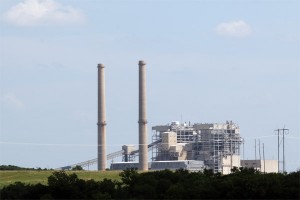
U.S. Supreme Court Won’t Hear Attorney General’s Challenge to Federal Haze Rule
-
Logan Layden

Joe Wertz / StateImpact Oklahoma
Oklahoma Gas & Electric's coal-fired Sooner Plant in Red Rock, Okla.
The U.S. Environmental Protection Agency’s Regional Haze Rule is meant to clear the air at national parks and wildlife refuges by reducing emissions from coal-fired power plants.
Oklahoma Attorney General Scott Pruitt and Oklahoma Gas and Electric — the state’s largest utility — have fought the Regional Haze Rule since the EPA rejected the state’s implementation plan in 2012, but it looks like this is the end of the line.
The U.S. Supreme Court on Tuesday declined to hear Pruitt and OG&E’s challenge to a lower court’s ruling in favor of the EPA’s decision to reject the Oklahoma plan.
“The Supreme Court’s decision not to hear Oklahoma’s regional haze lawsuit lets stand a bad legal precedent that places the states in an inferior position to EPA’s ‘command and control’ approach to regional haze regulation,” Pruitt tells StateImpact in an email. “Now, Oklahoma ratepayers will bear billions of dollars in costs for an onerous federal regional haze plan that even the EPA concedes barely provides a discernible difference in the visual quality of air.”
In effect, the EPA rule would require coal plants in Oklahoma and dozens of other states to shut down, install expensive air scrubbers, or switch to a different fuel source.
In a statement, OG&E spokesman Paul Renfrow says he’s disappointed, but that the company will now focus on “meeting the 55-month compliance deadline.” He says it could cost more than $1 billion to make the necessary changes.
But the reaction from environmental groups, like The Sierra Club, is just the opposite. Whitney Pearson, an organizer for Oklahoma Chapter of the Sierra Club’s Beyond Coal Campaign, says Oklahomans will get the cleaner, safer air they deserve because of Tuesday’s ruling.
“OG&E can responsibly replace their coal plants with local clean energy solutions,” Pearson says in a statement. “Wind is at its lowest cost in history and is saving customers money and cleaning the air.”
She also praised Public Service Company of Oklahoma — the state’s second largest utility — for choosing to gradually phase its coal plants out instead of fighting the EPA.
